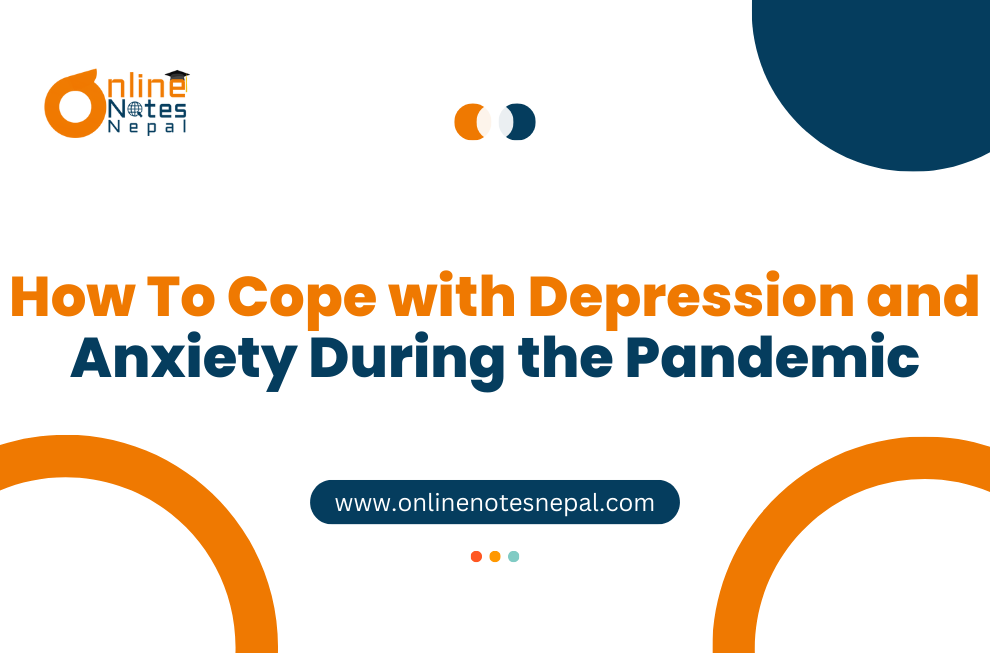Blogs



How To Cope with Depression and Anxiety During the Pandemic
Blog
How To Cope with Depression and Anxiety During the Pandemic
The world has significantly changed as a result of the COVID-19 epidemic, impacting almost every facet of daily life. Many people are experiencing a marked increase in despair and anxiety as a result of these extraordinary times, which include social isolation and financial insecurity. Managing these mental health issues calls for a proactive, multidimensional strategy. These are some methods to assist you cope with anxiety and despair throughout the epidemic.
1. Acknowledge Your Feelings
- Acceptance: Recognize that feeling anxious or depressed during a global crisis is normal. Accepting your emotions can be the first step towards managing them.
- Self-Compassion: Be kind to yourself and avoid self-criticism. Understand that it's okay to have bad days and to seek help when needed.
2. Maintain a Routine
- Consistency: Establishing a daily routine can provide structure and a sense of normalcy. This includes regular sleep, meals, and exercise.
- Work-Life Balance: If you work from home, set clear boundaries between work and personal time. Designate a specific workspace and take regular breaks.
3. Stay Connected
- Virtual Communication: Use technology to stay in touch with family and friends. Video calls, social media, and messaging apps can help maintain social connections.
- Support Groups: Join online support groups or forums where you can share experiences and receive support from others facing similar challenges.
4. Practice Mindfulness and Relaxation Techniques
- Mindfulness: Engage in mindfulness practices such as meditation, deep breathing exercises, or yoga. These techniques can help you stay present and reduce anxiety.
- Relaxation: Set aside time for activities that help you relax, such as reading, listening to music, or taking a warm bath.
5. Stay Physically Active
- Exercise: Regular physical activity can improve mood and reduce anxiety. Aim for at least 30 minutes of moderate exercise most days of the week.
- Outdoor Activities: If possible, spend time outdoors. Walking, hiking, or cycling can provide both physical and mental health benefits.
6. Limit Media Consumption
- News Intake: While it's important to stay informed, excessive exposure to news and social media can increase anxiety. Set limits on how much time you spend consuming news each day.
- Reliable Sources: Rely on reputable sources for information and avoid sensationalist or misleading news.
7. Seek Professional Help
- Therapy: Consult a mental health professional for assistance if you're experiencing anxiety or depression. Accessing support is made easier by the fact that many therapists provide teletherapy sessions.
- Medication: For some, medication may be necessary to manage symptoms. Consult with a healthcare provider to discuss your options.
8. Focus on What You Can Control
- Manageable Goals: Set small, achievable goals each day. This can provide a sense of accomplishment and purpose.
- Positive Actions: Pay attention to things under your control, like following health advice, keeping in touch, and looking after your emotional and physical wellbeing.
9. Practice Gratitude
- Gratitude Journaling: Keep a gratitude journal and write down things you're thankful for each day. This practice can shift your focus from negative to positive aspects of life.
- Mindful Appreciation: Take time to appreciate small joys, such as a beautiful sunset, a good book, or a delicious meal.
10. Be Patient with Yourself
- Time and Effort: Coping with depression and anxiety takes time and effort. Be patient with yourself and recognize that progress may be gradual.
- Celebrate Small Wins: Celebrate even the smallest of successes, regardless of how little they may appear. Every advancement counts.
Conclusion
Unprecedented difficulties brought about by the epidemic have made many people more depressed and anxious. You can better manage your mental health during these trying times by being aware of your feelings, keeping a routine, staying in touch, engaging in mindfulness practices, staying active, consuming less media, getting professional assistance, concentrating on the things you can control, expressing gratitude, and exercising patience with yourself. Never forget how crucial it is to ask for assistance when you need it and to take charge of your mental health.
